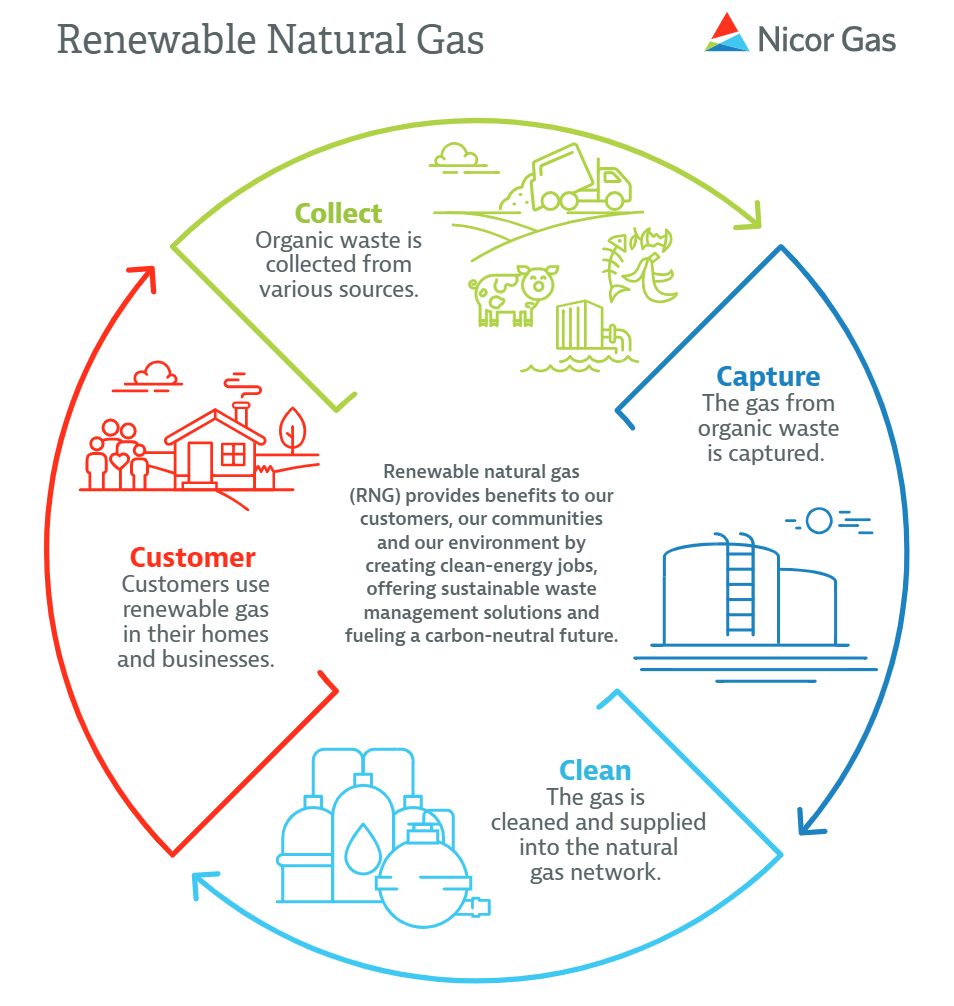Renewable Gas
Driving Sustainability with Renewable Natural Gas
At Nicor Gas, we believe natural gas is an important part of our nation’s effective transition to a clean energy future. We are committed to leading the industry in reducing the environmental impact of natural gas usage, including minimizing methane emissions across the natural gas supply chain.
To advance our commitment to sustainability, Nicor Gas has been a leader in emissions reductions through infrastructure modernization projects and other initiatives and aspires to achieve net-zero greenhouse gas emissions from its operations by 2050. Additionally, we empower our customers to reduce their carbon footprint through comprehensive energy efficiency programs.
Renewable gas will be a critical component to support greenhouse gas emission reductions in Illinois. While decreasing the carbon intensity of our fuel, it will boost customer value and provide resilient and affordable energy.
What is Renewable Gas and RNG?
RNG, short for renewable natural gas, is one type of renewable gas. RNG is a sustainable alternative fuel produced from naturally occurring methane that is captured primarily from landfill, agricultural, wastewater plants, and food waste sites. Capturing this biogas at the source before it is emitted into the atmosphere reduces the amount of greenhouse gas emissions that contribute to the warming of our planet. Because RNG is an interchangeable substitute for geologic natural gas, each cubic foot of RNG made available to our customers replaces a cubic foot of geologic natural gas from traditional supply sources, making our gas supply less carbon intensive. RNG can be used in existing natural gas appliances, equipment, and infrastructure.
Renewable gas is any pipeline-compatible gaseous fuel. It can also be derived from biogenic or other renewable energy sources. This includes methane-based RNG and low-carbon future fuels, such as hydrogen.
How is Renewable Gas produced?
RNG is produced using organic waste primarily from sources such as landfills, agriculture, wastewater plants and food waste sites. Methane is collected from the waste stream and integrated into anaerobic digesters or thermal gasification systems to produce methane-rich biogas. The biogas undergoes a process to clean and condition the gas to meet infrastructure quality requirements for transport and storage.
Renewable gas can also be produced from power-to-gas processes. Renewable electricity is used to convert water into hydrogen by using a process called electrolysis. Using a methanation process, the hydrogen can also be converted to methane.

What are the benefits of Renewable Gas?
Renewable gas provides a clean energy option that benefits our customers, our communities and our environment. Producing and using renewable gas contributes to emissions reductions and, in certain applications, the management of waste that would ultimately end up in a landfill. Utilizing RNG promotes energy resilience and fuel diversity through additional locally sourced supply options. This not only supports local economic investment and local jobs but also increases the flexibility and utilization of the existing natural gas system. RNG can be used the same way as geologic natural gas, including in homes and businesses, in manufacturing and heavy industries, for electricity production and for natural gas-powered vehicles. End-use natural gas customers do not need to make any changes to their equipment to accept and utilize this carbon-neutral energy source.
How is Renewable Gas transported?
Our existing infrastructure delivers clean, safe, reliable, and affordable natural gas to more than 2.2 million residential, commercial, and industrial customers across northern Illinois. Existing natural gas infrastructure can also be used to transport RNG. RNG can be used in existing natural gas appliances, equipment and infrastructure, and our company is engaged in research and development projects to understand how hydrogen can be blended in natural gas infrastructure.
What’s happening now?
Under Nicor Gas’s General Renewable Gas Interconnection Service tariff (Rate 82), Nicor Gas can receive new requests for interconnection to renewable gas facilities and work with local suppliers to integrate more renewable fuels into our system. Nicor Gas is also working with regulatory agencies, as well as local and state legislators, to explore bringing renewable gas to our communities and facilitate economy-wide carbon reductions while fueling resiliency, energy security and the growth of the clean energy economy.
General Renewable Gas Interconnection Service FAQ
What is Rate 82 (General Renewable Gas Interconnection Service)?
Rate 82 is available to any party who enters into a Renewable Gas Interconnection service Agreement with Nicor Gas for a renewable natural gas interconnection to deliver pipeline quality gas through the company's distribution system to our customers.
This interconnection service tariff allows RNG producers in Nicor Gas’ service territory to interconnect with Nicor Gas facilities to sell safe, pipeline-quality gas from an RNG facility to third parties for resale to Nicor Gas customers.
What is RNG?
RNG is a pipeline-quality alternative to geologic natural gas that can be carbon neutral or carbon negative. It is generally produced using methane - a gas with 25 times the warming effect of carbon dioxide - released by decaying organic waste collected in landfills, wastewater plants and farms or produced by renewable energy. The finished RNG product is interchangeable with geologic natural gas and can be injected directly into existing gas pipelines without upgrades.
How does participating in Rate 82 help to benefit the environment?
As an important renewable energy source, RNG has several environmental benefits such as offsetting greenhouse gas (GHG) emissions and other aspects associated with the production, combustion, use and transport of RNG when compared to geologic natural gas. In addition, in certain applications, RNG can provide local air quality benefits to communities. All these factors play an important part in helping our state and nation transition to a clean energy future.
What are the economic benefits of RNG projects?
RNG projects have the potential to create a variety of economic benefits to the State of Illinois through local temporary and permanent jobs and transforming the high cost of disposing waste into a local asset. Anaerobic digester and biogas upgrading system construction requires expertise in site work, plumbing, electrical, permitting and concrete that can provide work for many different local contractors and industries.
Is there an allowable investment from Nicor Gas in the interconnection facilities?
No, there is no allowable investment by Nicor Gas under Rate 82. The Renewable Gas Producer shall pay all costs of additional facilities required by the Company to provide interconnection service.
Is there a minimum target gas flow for a project?
No.
Will Nicor Gas provide the interconnection design or is the customer responsible for engaging the work?
For projects that advance to engineering design, the interconnect facilities will be designed by Nicor Gas. The costs of the engineering design are paid by the Renewable Gas Producer.
Where can I find out more about Rate 82 and the application process?
Please refer to Rate 82, and the Rate 82 Process Document overview here. To apply for interconnection, please visit the RNG Interconnection Portal.
How can potential producers or suppliers learn more about Nicor Gas General Renewable Gas Interconnection Service?
To learn more, please email renewablegas@southernco.com.


